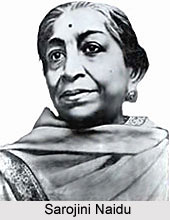 Sarojini Naidu was the first Indian woman to become the President of the Indian National Congress and the first woman to become the governor of a state in India. Sarojini Naidu was one of the most prominent leaders of the Congress. She had been associated with the Indian National Congress even before Mahatma Gandhi appeared on the scene in India. Her first guru had been Gopal Krishna Gokhale who fuelled in her the fire of patriotism. For many years she was the member of the Congress Working Committee and was elected as the President of the Kanpur Session of the Congress. She addressed many sessions of the Muslim League and remained on in friendly terms with Mohammad Ali Jinnah. When India became independent and Congress Ministries were formed in the Provinces, she was appointed, as the Governor of Uttar Pradesh. During her Governorship the Cabinet functioned smoothly and there were no frictions.
Sarojini Naidu was the first Indian woman to become the President of the Indian National Congress and the first woman to become the governor of a state in India. Sarojini Naidu was one of the most prominent leaders of the Congress. She had been associated with the Indian National Congress even before Mahatma Gandhi appeared on the scene in India. Her first guru had been Gopal Krishna Gokhale who fuelled in her the fire of patriotism. For many years she was the member of the Congress Working Committee and was elected as the President of the Kanpur Session of the Congress. She addressed many sessions of the Muslim League and remained on in friendly terms with Mohammad Ali Jinnah. When India became independent and Congress Ministries were formed in the Provinces, she was appointed, as the Governor of Uttar Pradesh. During her Governorship the Cabinet functioned smoothly and there were no frictions.
Personal life of Sarojini Naidu
Sarojini Naidu was considered to be a distinguished poet, renowned freedom fighter and one of the great orators of her time. She was born on 1876 as the daughter of Aghornath Chattopadhyaya and Bharada Devi. Her father was a known linguist and the founder of Nizam College and her mother was a Bengali poetess. Sarojini was sent to England to study while she was in her teens. On her return to India, she married Dr. Naidu, a non-Brahmin, under the Brahmo Marriage Act in Chennai. She was blessed with four children.
Sarojini Naidu as a Freedom Fighter
Sarojini Naidu is acclaimed as a freedom fighter. After meeting Gandhiji she totally contributed herself to the service to bring an independent India. She was responsible to make Indian women awaken. As a freedom fighter Sarojini was imprisoned many times. On one instance she was troubled by fever and frequent attacks of diarrhoea. It appeared as though the authorities might consider releasing her on health grounds. But it was the time of Bapu`s impending 21-day fast and she would not leave the prison at such a juncture. When the fast came, she took upon the responsibility of regulating the stream of visitors who were allowed to see Gandhi and cutting short interviews as soon as she saw signs of fatigue in Bapu. Sarojini described Gandhi as: "A little man with shaven head, seated on the floor on a black prison blanket and eating a messy meal of squashed tomatoes and olive oil out of a wooden prison bowl." She presented to Gandhi 31lakhs collected from all over India on behalf of the Collection Committee. It was with this money that Kasturba Gandhi National Memorial Trust (named after Kasturba Gandhi) was set up by Bapu for the service of women and children in the villages. The activities of the Trust comprised health, education, welfare, training for income-generating activities and building up among village women awareness of their potential strength and making them conscious of the rights given to them by the Constitution of India.
Sarojini Naidu as a Poetess
She was a born poet, with great felicity in English language. Her poetry contains the lyrics which could also be sung as well. Her collection of poetry was published in 1905 under the title "Golden Threshold". She published two other collections also naming "The Bird of Time", and "The Broken Wings". Later, "The Magic Tree", "The Wizard Mask", and "A Treasury of Poems" were published. Mahashree Arvind, Jawaharlal Nehru, and Rabindranath Tagore were among the thousands of admirers of her work. In most of her poems she induces the spirit of nationalism.
Sarojini Naidu led a strenuous and hectic life. She travelled all over India and carried India`s message to the USA and other countries. She was a participant in the Second Round Table Conference as a representative of Indian women, along with Gandhiji. After Gandhiji`s assassination Sarojini Naidu`s health began to deteriorate. She had high blood pressure and respiratory trouble. Her condition worsened and on 2 March 1949, at Lucknow district, she passed into eternal sleep. The Government of Uttar Pradesh paid his final tribute to Sarojini in these words. "A brilliant orator, a great poetess, a person endowed with unusual charm and sense of humour as well as oratory, administrative skills and popular leadership".






